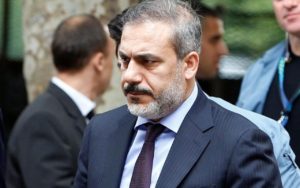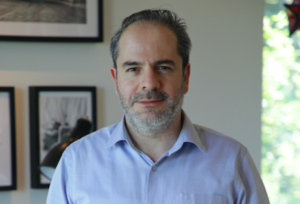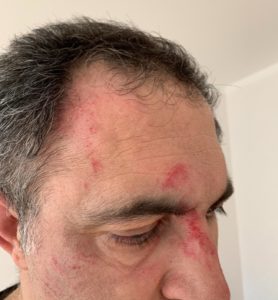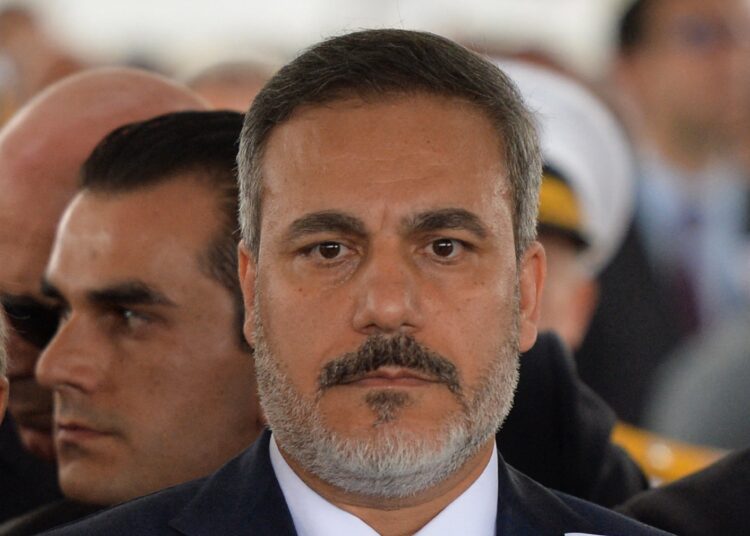Nordic Monitor/Stockholm
As he tried to defend his record, the head of Turkey’s notorious intelligence agency Milli İstihbarat Teşkilatı (MIT) admitted to having targeted journalists and media professionals abroad in a recent report published by the agency.
In the 16-page report, obtained by Nordic Monitor, MIT chief Hakan Fidan, a close confidant of Turkish President Recep Tayyip Erdoğan, wrote that in the year 2022 “[t]he work on deciphering the black propaganda attempts aimed at undermining our country has continued without interruption.”
What Fidan described as “black propaganda” is a reference to coverage critical of Turkey by journalists who were forced to go into exile and pursue their careers abroad after the Erdoğan government started arresting journalists by the hundreds, wiping out nearly the entire critical, independent and opposition media in Turkey over the last decade.
The undated report, written some time in March 2023, is the assessment of the work done by the intelligence agency in 2022 and tantamount to an admission of targeting and harassing Turkish journalists who live in Europe and North America, where MIT agents run illegal surveillance operations.
Fidan publicly owned up to this surveillance and bragged about intelligence gathering that targets critical journalists by presenting this as one of the successes of the agency under his watch.
MIT’s spying on journalists in Europe was exposed last year when the agency leaked surveillance photos and the residential addresses of journalists who live in Germany and Sweden as part of the Erdoğan government’s intimidation campaign.
Full text of the MIT report that was published this year and covered the activities of the agency for 2022:
Last year, MIT agents ran surveillance on journalist Abdullah Bozkurt, who lives in Sweden, and later leaked photos to the Sabah newspaper, a government mouthpiece owned and operated by President Erdoğan’s family, in October 2022. The paper published secretly taken photos of him and revealed his home address.
The Sabah story showed that MIT agents mapped out the journalist’s daily routine, followed him outside his home and photographed him and his residence. HIs personal information was published by Abdurrahman Şimşek, who is on the MIT payroll and operates under direct orders from Serhat Albyrak, the brother of Erdogan’s son-in-law Berat Albayrak.
Bozkurt, who was attacked by three unidentified men in September 2020 in front of his previous home in a Stockholm suburb, had moved to a safe location. His address and personal information were kept secret under Sweden’s laws protecting vulnerable persons. During the attack, he suffered scrapes and bruises to his face, arms and legs and was treated at a local hospital and then released.
By disclosing the journalist’s protected address and spying on his daily routine, Turkish intelligence agents and its operatives at Sabah broke several Swedish laws.
Bozkurt, director of the Nordic Research and Monitoring Network, a non-profit organization based in Stockholm, and a Middle East Forum Writing Fellow, has long been in the crosshairs of the Turkish government and its proxies because of critical articles and research papers that exposed the Erdoğan government’s links to jihadist groups including al-Qaeda and the Islamic State in Iraq and Syria (ISIS).

He had to flee Turkey in 2016 to escape wrongful imprisonment on fabricated charges and sought shelter in Sweden, a country with a robust tradition of protecting freedom of expression and the press.
The Erdoğan government did not leave him alone and continued its harassment and intimidation campaign in Sweden as well.
In December 2016 Cem Küçük, a government propagandist with close ties to the Turkish interior and justice ministers, called for MIT to assassinate Bozkurt. Speaking on TGRT TV, a loyalist government media outlet, Küçük said Bozkurt’s home address in Stockholm was known by Turkish authorities and demanded the “extermination” of the journalist.
“No need to beat around the bush anymore. Where they [critical journalists] live is known, including their addresses abroad. Let’s see what happens if several of them get exterminated. How terrified would they be if you put a bullet into the heads of some [critical] journalists,” he said.
Speaking about Bozkurt, Küçük said that “his home address is known by the [Turkish] state,” prompting the other guest, Fuat Uğur, to say, “They mustn’t be able to live comfortably wherever they are.” In response Küçük, said: “Right. Kill three or four of them and see what happens. Turkish intelligence agency MIT now has the authority [to carry out killings] abroad.”
Küçük was investigated in the past over Iranian Islamic Revolutionary Guard Corps (IRGC) Quds Force activities in Turkey, and Bozkurt’s writings on the Quds Force’s clandestine operations apparently bothered him.

Mesut Hakkı Caşın, the Turkish president’s advisor on security and foreign policy, openly threatened Bozkurt with murder on live TV, broadcast by a national television network, saying Turkish intelligence would find him and feed him to the sharks.
Speaking during a debate program on CNN Türk, a pro-government media outlet, on January 15, 2021 Caşın targeted Bozkurt and said: “Turkish national intelligence will find him, I’ll tell you that. I don’t know whether MIT will feed him to the fish or the sharks, but traitors always ultimately get their punishment,” he said.
Caşın, a 65-year-old professor and former military officer, is a member of Turkey’s Presidential Security and Foreign Policy Board advising Erdoğan on strategic matters.
Levent Kenez, the Swedish-based editor of Nordic Monitor, was also tracked by Turkey’s intelligence agency, which leaked his private information to the media back home. Bülent Keneş, former editor-in-chief of Today’s Zaman, which was shut down by the Erdoğan government; purged police chief and former security advisor of Nordic Monitor Murat Çetiner; and investigative journalist Cevheri Güven, who resides in Germany, were also recently targeted by the intelligence agency.

Head of the Swedish Journalists Union Ulrika Hyllert called on the Swedish government to protect Turkish journalists in an article for the Swedish Expressen daily on October 31, 2022.
“By using Sweden’s NATO membership as a hostage, President Erdoğan now wants to stifle the critical voices that are still heard from Sweden. Here, the Swedish government must clearly take a position in favor of freedom of expression.
“The journalists who are being hunted by Erdoğan in Sweden must be protected by the Swedish authorities. Sweden must stop pretending that the demands that Turkey puts forward in the negotiations rest on democratic foundations.
“We demand that the government in the talks with Turkey stand up for the protection of human rights in a way that befits a democracy like Sweden,” she wrote.
In 2021 the Swedish Supreme Court rejected a request from Turkey for Kenez’s extradition, ruling that Turkey’s allegations against him did not contain the element of a crime under Swedish law. The high court also stated that if Kenez returned to Turkey, he would face the risk of persecution.

The Supreme Court ruled that Kenez’s journalistic activity as editor-in-chief of the Meydan daily would not correspond to a crime under Swedish law, contrary to Turkey’s allegations, even if his newspaper were to have had links to a particular designated organization, referring to the Gülen movement, a group critical of Erdoğan.
The high court also pointed out that extradition cannot take place because of descent, belonging to a certain social group or religious or political opinions and added that the risk of persecution in the foreign state is another obstacle to approving extradition requests.
The court also referred to Kenez’s political refugee status, which was granted due to the risk of persecution.
Kenez was the former editor-in-chief of the Meydan daily, which was illegally shut down by the Turkish government in 2016. He was briefly detained during a police raid on its headquarters in İstanbul following a controversial coup attempt in 2016. A new arrest warrant was issued the day after his release. Kenez had to flee Turkey by crossing the Evros River to Greece to avoid the risk of prosecution and arbitrary arrest. He has since then been living in exile in Sweden.
In the same report MIT chief Fidan further admitted to expansive transnational repression by the agency and said, “[M]ore than 100 members of the [Gülen movement] from different countries were brought to Turkey as a result of the [agency’s] increased operational capacity abroad.” In recent years, the Erdoğan government has employed extralegal methods to secure the return of its critics after its official extradition requests were denied.

Erdoğan has been targeting followers of the Gülen movement, inspired by Turkish Muslim cleric Fethullah Gülen, since the corruption investigations of December 17-25, 2013, which implicated then-prime minister Erdoğan, his family members and his inner circle. Dismissing the investigations as a Gülenist coup and conspiracy against his government, Erdoğan designated the movement as a terrorist organization and began to target its members.
A report by the Stockholm Center for Freedom released in October 2021 and titled “Turkey’s Transnational Repression: Abduction, Rendition and Forcible Return of Erdoğan Critics” focused on how the Turkish government under President Erdoğan has used extrajudicial and illegal methods for the forcible transfer to Turkey of its citizens abroad. In several of these cases the UN Working Group on Arbitrary Detention (WGAD) concluded that the arrest, detention and forced transfer to Turkey of Turkish nationals was arbitrary and in violation of international human rights norms and standards.
Representatives of the Belgian-based law firm Van Steenbrugge Advocaten (VSA), the Turkey Tribunal VZW nongovernmental organization and European judges association Magistrats Européens pour la Démocratie et les Libertés (MEDEL) announced at a news conference in The Hague on March 1 that they had sent a communication to the International Criminal Court (ICC) that includes evidence of crimes against humanity committed in Turkey.
The communication alleges that Turkish officials have committed crimes of “torture,” “enforced disappearances,” “imprisonment in violation of fundamental rules of international law” and “persecution,” which are crimes against humanity as defined by Article 7 of the Rome Statute.
The communication to the ICC includes 463 individual statements of torture relating to 800 persons and 59 cases of extraterritorial and domestic enforced disappearance relating to 109 persons.












